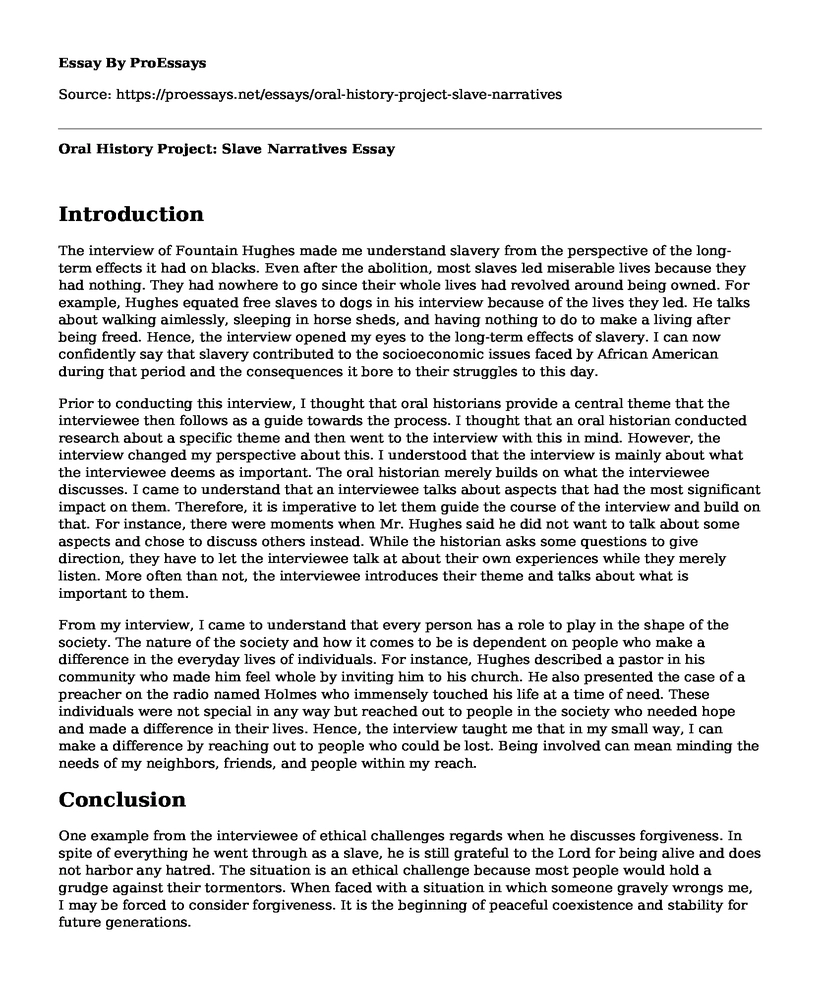Introduction
The interview of Fountain Hughes made me understand slavery from the perspective of the long-term effects it had on blacks. Even after the abolition, most slaves led miserable lives because they had nothing. They had nowhere to go since their whole lives had revolved around being owned. For example, Hughes equated free slaves to dogs in his interview because of the lives they led. He talks about walking aimlessly, sleeping in horse sheds, and having nothing to do to make a living after being freed. Hence, the interview opened my eyes to the long-term effects of slavery. I can now confidently say that slavery contributed to the socioeconomic issues faced by African American during that period and the consequences it bore to their struggles to this day.
Prior to conducting this interview, I thought that oral historians provide a central theme that the interviewee then follows as a guide towards the process. I thought that an oral historian conducted research about a specific theme and then went to the interview with this in mind. However, the interview changed my perspective about this. I understood that the interview is mainly about what the interviewee deems as important. The oral historian merely builds on what the interviewee discusses. I came to understand that an interviewee talks about aspects that had the most significant impact on them. Therefore, it is imperative to let them guide the course of the interview and build on that. For instance, there were moments when Mr. Hughes said he did not want to talk about some aspects and chose to discuss others instead. While the historian asks some questions to give direction, they have to let the interviewee talk at about their own experiences while they merely listen. More often than not, the interviewee introduces their theme and talks about what is important to them.
From my interview, I came to understand that every person has a role to play in the shape of the society. The nature of the society and how it comes to be is dependent on people who make a difference in the everyday lives of individuals. For instance, Hughes described a pastor in his community who made him feel whole by inviting him to his church. He also presented the case of a preacher on the radio named Holmes who immensely touched his life at a time of need. These individuals were not special in any way but reached out to people in the society who needed hope and made a difference in their lives. Hence, the interview taught me that in my small way, I can make a difference by reaching out to people who could be lost. Being involved can mean minding the needs of my neighbors, friends, and people within my reach.
Conclusion
One example from the interviewee of ethical challenges regards when he discusses forgiveness. In spite of everything he went through as a slave, he is still grateful to the Lord for being alive and does not harbor any hatred. The situation is an ethical challenge because most people would hold a grudge against their tormentors. When faced with a situation in which someone gravely wrongs me, I may be forced to consider forgiveness. It is the beginning of peaceful coexistence and stability for future generations.
Cite this page
Oral History Project: Slave Narratives. (2022, Jun 19). Retrieved from https://proessays.net/essays/oral-history-project-slave-narratives
If you are the original author of this essay and no longer wish to have it published on the ProEssays website, please click below to request its removal:
- An Outline of the Individual and Examples of their Leadership Behavior
- Abraham Lincoln, Slavery and the American Civil War Essay
- The Accident That Changed Frida Kahlo's Life - Essay Sample
- Civil War Improved US Living Standards: Essay Sample on Hospitals & Ambulance
- Essay Example on Unveiling the Ancient Mayan Culture: From its Height to Abrupt Demise
- Social Security Act: A Radical Proposal for the Underprivileged - Research Paper
- The Eighteenth Century Slavery - Essay Sample







